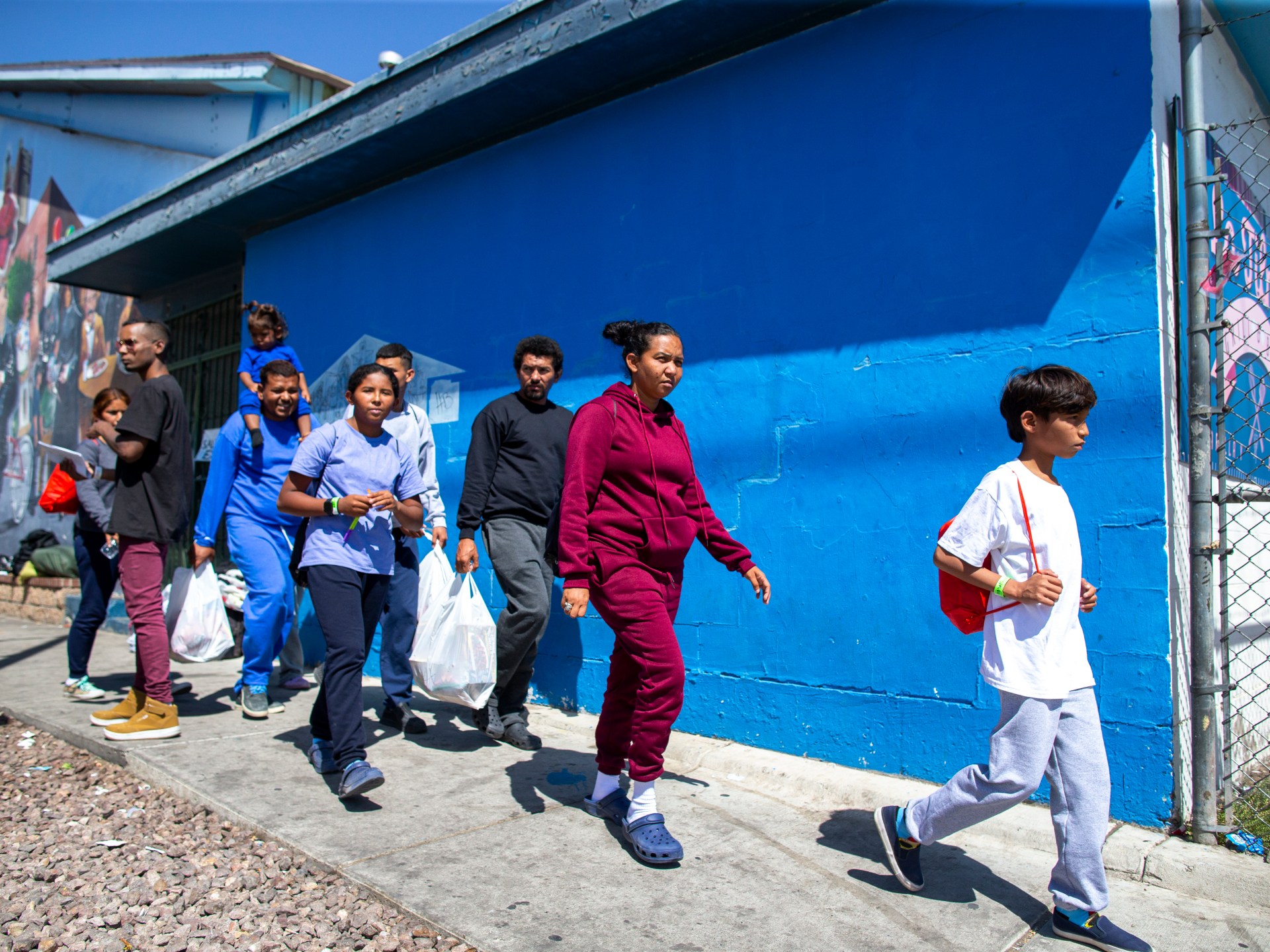
Texas has its fight for one controversial new law – which would allow local authorities to arrest and detain migrants – enforceable.
The law has been the subject of an ongoing legal battle with the United States Supreme Court allow briefly It is due to come into force on Tuesday.
But a few hours later, a lower court blocked implementation as the constitutionality of the law continued to be questioned. This court heard further arguments weighing the recess on Wednesday.
As the Republican-led government in Texas redoubles its efforts and promises to defend the law in any litigation, civil rights activists have also vowed to do everything in their power to prevent the law from taking effect.
But they warn that the law and its uncertain fate only add to the confusion and fear surrounding immigration to the United States.
“Our community has endured a legal and emotional roller coaster and this anti-immigrant law [is] “Very extremist, probably the harshest we’ve ever seen in the country,” said Christine Bolanos, a representative of the Texas-based Workers Defense Project, which represents migrant workers.
“We know we are in limbo, and we are doing our best to continue to keep our community informed and fighting alongside our partners and allies.”
The law – known as Texas Senate Bill 4 or SB4 — was originally signed by Republican Texas Gov. Greg Abbott in December.
But it has since faced legal challenges from human rights groups such as the American Civil Liberties Union (ACLU) and President Joe Biden’s administration, who claim it violates the U.S. Constitution.
They argue that the federal government has sole authority to set and enforce immigration policy.
But for community groups like the Workers Defense Project — which is not part of the current lawsuit — SB4 raises the specter of racial profiling and other abuses of power by law enforcement.
Bolanos told Al Jazeera there is still much work to be done to equip migrants and asylum seekers with information to help them navigate the uncertainty surrounding SB4.
“The vast majority of our members are migrant workers fleeing violence and other injustices in Latin America, only to be confronted with such measures,” Bolanos said.
She explained that her organization works to ensure that migrants and asylum seekers “understand their rights, regardless of their legal status.” The group also provides tips on how to behave if an officer approaches someone about their immigration status.
“We have also started working on what we call a ‘dignity plan’. This includes an emergency checklist to ensure our members have everything they need to be prepared for the worst,” said Bolanos.
“If they are threatened with deportation, do they have their child’s passport? Who else can pick up their children from school other than them? Who has the authority to enter his house?”
“These are things that everyone who is undocumented in Texas needs to think about,” she added.
“A great fear”
The Texas law would authorize state and local authorities to detain people suspected of entering the U.S. from Mexico outside of legal ports of entry.
Undocumented people face up to 20 years in prison, but the law allows them to avoid prosecution if they agree to be deported to Mexico, regardless of their country of origin.
The Mexican government condemned the law as “inhumane” and said the country would not accept migrants and asylum seekers deported by Texas.
On Wednesday, Mexican President Andres Manuel Lopez Obrador also called SB4 a violation of international law.
Human rights activists say the law is the state’s most draconian yet. It is part of a series of state laws aimed at stemming the flow of migrants and asylum seekers at the border.
Some of these laws fall under the auspices of Operation Lone Stara $12 billion initiative in which state authorities laid razor wire along the border, built a floating fence in the Rio Grande and sent members of the Texas National Guard to the area.
But critics have pointed to the particular danger of increased racial profiling under SB4.
Texas is already a “minority-majority state” where ethnic and racial minorities outnumber the white population. An estimated 42 percent of Texans identify as Latino, 10 percent are African American and another 5 percent are Asian American.
As the court battle to uphold SB4 continues, Texas continues to arrest illegal immigrants for criminal offenses.
More than 41,000 criminal arrests were made.
We continue to build a border wall, use natural gas to erect barbed wire to keep migrants out, and maintain buoy barriers in the river.
– Greg Abbott (@GregAbbott_TX) March 20, 2024
According to Domingo Garcia, national president of the League of United Latin American Citizens (LULAC), these communities are expected to bear the brunt of the law.
Such a law could have particularly devastating consequences in communities with “mixed” families made up of U.S. citizens and undocumented members, he explained.
“There is a great fear that a father could one day go to work, be stopped by the police, then arrested and deported,” Garcia said. “His children could return home to an empty home.”
Like the Workers Defense Project, LULAC uses its resources to reach the most vulnerable people in Texas.
The organization is launching a “very extensive communications program” with ads on Spanish-language television channels such as Univision and Telemundo, as well as through social media and WhatsApp.
“We are also talking to the Protestant churches, who are very supportive of our efforts, as well as the bishops of the Catholic Church,” Garcia said.
“And we are holding community meetings with local elected officials, including members of law enforcement, who oppose this bill because they believe it takes resources, officers and prison space away from real criminals.”
“Honestly, it’s pretty crazy.”
LULAC and other organizations organized a similar public awareness campaign in response to a 2010 Arizona immigration law known as SB 1070.
This law made it a federal crime for undocumented people to live and work in the United States. It also allowed the arrest of people suspected of being in the country without judicial authorization and required local law enforcement to check the immigration status of people stopped by police.
A lawsuit challenging Arizona’s SB 1070 eventually made its way to the U.S. Supreme Court. The majority ruled that the federal government has “broad, uncontested power over immigration and alien status” – reaffirming its sole authority on the matter.
However, the Supreme Court has not ruled on the merits of Texas’ SB4.
But critics believe SB4 is more extreme than the 2010 Arizona law. Emma Winger, deputy legal director at the American Immigration Council, believes SB4 could eventually make its way to the Supreme Court, where a ruling upholding the law could spark change.
Winger said the chances were slim that the court would uphold the law in its entirety because there was little precedent for its constitutionality.
Still, Winger added, the court’s conservative majority could make a surprising decision: “I wouldn’t fault this Supreme Court. They have shown that they are quite willing to overrule previous precedents.”
If ultimately upheld, the Texas law would almost certainly apply in other states, including those far from the border, Winger said.
She pointed to a bill recently passed in the Iowa state legislature that would also allow the state’s authorities to arrest and deport migrants for being in the country without legal status.
“[The Texas law] “Create these kinds of independent, parallel and contradictory immigration systems that operate simultaneously, without the oversight, permission or supervision of the federal government,” Winger told Al Jazeera. “Honestly, it’s pretty crazy.”
“And we also have the potential for a real diplomatic crisis – a situation in which the state of Texas finds itself in a standoff with the Mexican federal government and interfering in a very complicated and important federal relationship of the United States.”
“Pole through the Statue of Liberty”
While the legality of SB4 is being debated in court, it can still impact the everyday lives of migrants and asylum seekers, said Bolanos of the Workers Defense Project.
“There is a discussion going on around the dinner table in their homes about whether or not they need to take immediate action,” she explained, “whether they need to move out of Texas or not.”
“Aside from the feeling of being in limbo, the frustration, the deep disappointment and the demoralization, I think it’s also just extreme shock and disappointment at how ignorant, hateful and divisive our current system really is,” said she.
LULAC’s Garcia added that the current litigation represents a larger question of U.S. values.
If the law were to stand, it would be a “statement of the Statue of Liberty and what America stands for as a country of immigration,” he said.
“One would say that the fear mongers and the hate mongers are winning at the national level and are leading us into a dark side of American history.”






Recent Comments